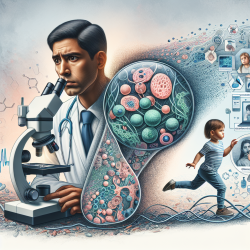The recent study on the De novo TRPM3 missense variant associated with neurodevelopmental delay and manifestations of cerebral palsy sheds light on the genetic underpinnings of certain neurodevelopmental disorders. This research identifies a specific missense variant in the TRPM3 gene that is linked to both neurodevelopmental delays and manifestations of cerebral palsy (CP). For practitioners in the field of special education and therapy services, understanding these findings can be pivotal in improving therapeutic strategies and outcomes.
The Role of TRPM3 in Neurodevelopment
TRPM3 is a nonselective cation channel involved in calcium ion signaling, crucial for various physiological processes. The study highlights a de novo missense variant, p.(Asn1126Asp), found in the ion transport domain of the TRPM3 protein. This variant has been associated with neurodevelopmental delays, intellectual disabilities, and now, manifestations of CP.
The findings suggest that pathogenic variants in TRPM3 can disrupt normal protein function, leading to significant developmental challenges. This adds TRPM3 to the growing list of genes linked to Mendelian diseases that manifest symptoms similar to CP.
Implications for Practitioners
Practitioners working with children exhibiting symptoms of CP or related neurodevelopmental disorders can benefit from this research by:
- Enhancing Diagnostic Accuracy: Understanding genetic contributions can aid in more accurate diagnoses. Genetic testing for TRPM3 variants could become a part of standard diagnostic procedures for unexplained cases of CP-like symptoms.
- Tailoring Therapeutic Approaches: Knowledge of specific genetic mutations allows therapists to customize interventions based on the underlying biological mechanisms rather than just symptomatic treatment.
- Encouraging Further Research: Practitioners are encouraged to stay informed about ongoing research in genetics and neurodevelopment. Collaboration with researchers can lead to new insights and potentially novel therapeutic approaches.
Moving Forward with Research
This study opens up new avenues for understanding the complex relationship between genetics and neurodevelopmental disorders. Practitioners should consider integrating genetic insights into their practice to enhance patient outcomes. Continuous professional development through conferences, webinars, and publications is essential for staying updated on such advancements.
To read the original research paper and delve deeper into these findings, please follow this link: De novo TRPM3 missense variant associated with neurodevelopmental delay and manifestations of cerebral palsy.










